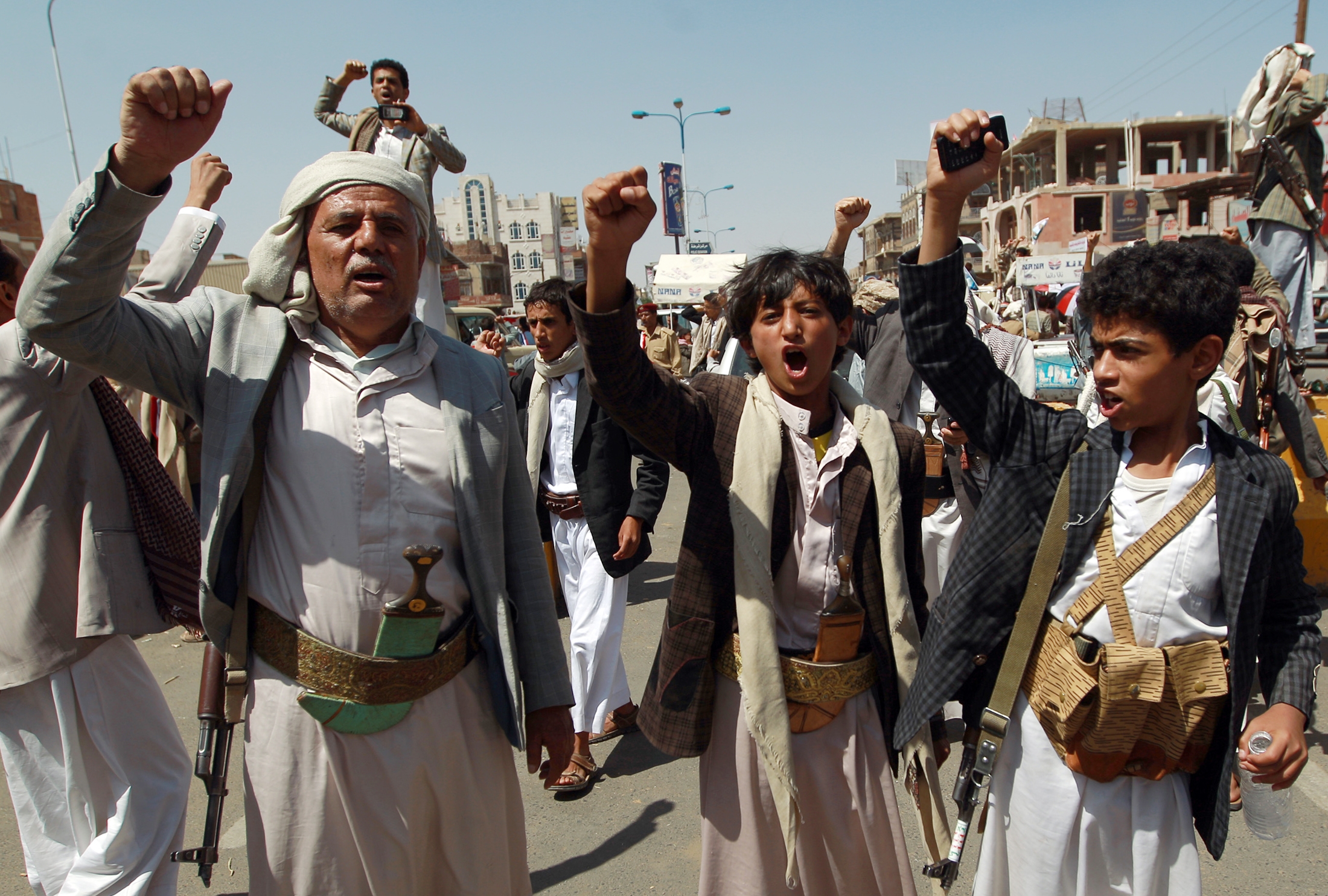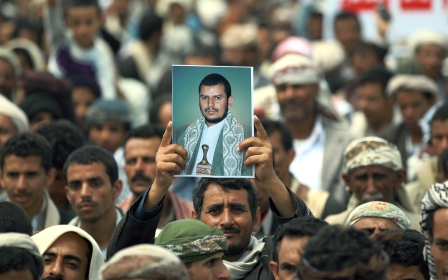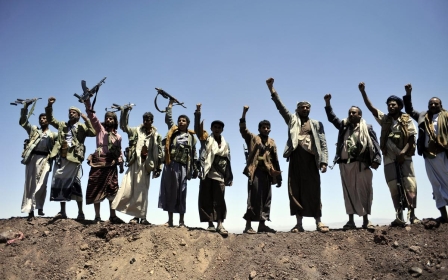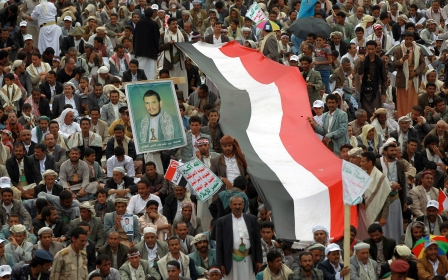Journalists in Yemen seek protection from Houthis

AL-MUKALLA: Six heavily armed men in two pickups approached the Yemeni journalist Amen al-Safa'a on Thursday as he started his car in the capital Sana'a.
"Are you the editor of al-Sharea newspaper," they asked. "Yes, I am," he answered. The men then hurled abuse at him. "You are linked to the Muslim Brotherhood [and Dawaed (Islamic State), and our people do not buy your biased newspaper," they told him, Safa'a said to MEE.
Safa’a believes the men wee linked to a Shi’ite rebel group that has swiftly tightened its grip on the Yemeni capital over the past week after a deal was agreed with the government to end weeks of deadly protests.
The Houthis. or Ansar Allah (Supporters of God), launched their large rallies a month ago, and blocked roads and government buildings to protest against the government’s economic and political policies.
However, instead of just staying put in the streets of the capital Saan’a, the Houthis also engaged in heavy clashes with Sunni army soldiers and tribesmen in northern Yemen, managing to beat back government allied fighters.
After the short conversation with the armed men, al-Safa'a told MEE, he decided to take his entire family to his small village in the province of Dhamar, in southwestern Yemen, in fear of their safety.
"Those [Houthis] are close-minded, and I see their remarks as a threat to me and my colleagues at the newspaper," Safa'a said.
Safa'a is the second-in-command of one of the the country’s most popular newspaper, which is generally regarded as non-partisan, and he believes that if someone in his position can be singled out other journalists are likely to face a similar threat.
"I immediately contacted my boss and the head of Journalists Syndicate and informed them about Houthi threats,” Safa'a said. “I did not know how they identified my location."
Reprisal attacks
Along with many protests at government buildings and military posts in the Yemeni capital, the Houthis have launched a string of attacks on media outlets owned by their rival Islamist Islah party - seen as Yemen’s Muslim Brotherhood wing - as well as other media platforms deemed to be critical of the Houthi cause.
Suhail TV was the first opposition TV station that was stormed by the Houthis a day after the rebels took control of the capital on 21 September.
This private TV station is funded by Hamid al-Ahmer, a prominent businessman and opposition figure who challenged the regime of former president Ali Abdulla Saleh in 2011. Founded in 2009, the TV station intensively covered the government's last war on the Houthis and anti-regime protests in 2011.
On 22 September, a group of Houthis broke into the station's main building in the capital and questioned its staff for hours.
"They asked about the contacts and the addresses of the TV station’s staff,” the station’s director, Mohammad Qaizan, told MEE by telephone. “By the end of the day, they brought a lorry and took away all broadcasting equipment."
Qaizan said that the Houthi’s spokesperson went to the TV station shortly after the incident to apologise for the attacks and promised to return the equipment.
"The political wing of the Houthis expressed their dismay over the attacks, but did nothing to stop them, and our belongings are still in their custody," Qaizan said.
Al-Shomoa Media Establishment is one of the platforms that has criticised the Houthis for years.
This time, the Houthis did not head to the establishment but rather stormed the house of its owner, Saif al-Hadhari, in the capital on Wednesday and turned it upside down.
"The broke my house's doors and looted it,” Hadhari said. “They also sent me threats to change my reporting."
Hadhari now thinks that the proliferation of Houthi men in the capital will have "grave" consequences on freedoms and the future of the country.
"Those are militiamen who do not believe in freedom of expression and can use their arms [guns] if your criticise them," he said.
Appeal for help
The Yemen Journalists Syndicate, an umbrella organisation for hundreds of journalists in Yemen, has issued more than one statement condemning the Houthi attacks on TV stations, newspapers and journalists.
Marwan Dammaj, the syndicate’s secretary-general, told MEE that the organisation has drummed up support from all journalists in the capital, across the country and international organisations to mount pressure on Houthis to stop attacking journalists.
Dammaj complained that Houthi-linked journalists in the capital are paying lip services to their attacked colleagues but are failing to stop the attacks.
"Ali Al Bikhiti and Abdul Karem Al Khiwani [both Houthis] have condemned the attacks and apologised, but nothing has changed on the ground," Dammaj said.
The militants only execute orders that come from the Houthi capital of Sa'dah, not Sana'a, he said.
"The Houthis [tried to] bomb the National TV, broke into Suhail TV and confiscated its equipment, attacked the house of al-Shomoa Media Establishment and others," Dammaj said.
Remorse
The Sana'a-wide spread of looting, vandalism and attacks on media establishments and journalists have jolted many Houthi activists into publicly criticising their movement and urging their leader to return stolen property and apologise.
Ali al-Bithiki, the group’s spokesperson, said on his Facebook page that he would stand by those media outlets that were attacked and would not come to the defence of the Houthis until his superiors ordered looters to return people's property and Suhail TV’s broadcasting equipment.
"There are some mistakes associated with the revolution, and the biggest mistake will be to justify or take pride in these mistakes," he said. "I will not be able to appear on any media outlets or give any statement until Suhail TV goes on air again from its station in Roubat Street in Sana'a."
Al-Bithiki blamed what he described as "new members" of the movement who joined between 2011 and 2014 for the attacks on opponents and cases of pillaging.
Privilege
Unlike many of their peers in Arab countries, Yemeni journalists have long enjoyed relative freedom as many of them can freely criticize the president. However, violence has long afflicted the profession, and in the past Yemen journalists, including those loyal to the Houthis, suffered many deadly attacks before the recent flare-up of violence in the capital.
The presidential guard in June raided a TV channel and newspaper funded by former president Ali Abdullah Saleh and confiscated equipment. The newspaper resumed printing, but the TV remained off the air. The government accused Saleh's TV station of inciting people to protest against the government as it was moving to apply an increase in the price of fuel.
New MEE newsletter: Jerusalem Dispatch
Sign up to get the latest insights and analysis on Israel-Palestine, alongside Turkey Unpacked and other MEE newsletters
Middle East Eye delivers independent and unrivalled coverage and analysis of the Middle East, North Africa and beyond. To learn more about republishing this content and the associated fees, please fill out this form. More about MEE can be found here.




